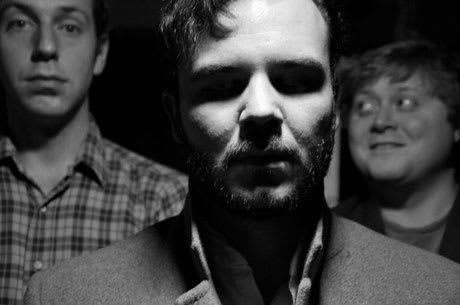Toward the end of Future Islands' sold-out show, there was spied a dancing couple in unwieldy winter fleeces, twirling and gliding over the busy floor. They slow-danced, fast-danced and, when they collapsed, helped each other up and resumed double-speed, their grins as wide and wild as their berth.
Future Islands are a band obsessed with falling hard, picking up and healing the wounds with foot-moving euphoria. While disposable synth-pop has made a cliché of the self-involved breakup album, Future Islander Samuel T. Herring has made a career of his breakup life. He is intense, likeable, and looks as if about to cry; throughout the set he keeps a dragon in his throat, something scabrous and fierce, but behind his comically expressive performance is a sense of restraint, suggesting something even greater trapped beneath.
The stage banter veered between faux-sexual exhortations and wrenching pathos. His "This song's about someone I once knew, but don't know anymore" got vocal audience sympathy, as did one about "someone you can never say goodbye to." But it was all in the show's redemptive spirit, Herring's moves somewhere between catharsis and karate, as the chest-beating outbursts translated raw emotion without the curlicues of melodrama. When "Tin Man" sees him rise from a crouch, grotesquely leering, "I am a Tin Man!" you didn't just accept it as performance; you completely empathized.
As movement gradually infected the crowd, Herring's band faithfully backgrounded themselves; for them, the room offered nothing more interesting than keyboards and shoelaces. Formerly a drum-machined trio, Future Islands have become a four piece to play new and old material with a live drummer. His cymbals, silhouetted grandly against the velvet backcurtain, give Herring's hunched frame two shadowy angel wings with a 4/4 shimmer.
While blog hits like "Balance" and "Before the Bridge" attracted the necessary hysteria, a host of beat-driven new tracks slotted in neatly to keep pulses frantic. One highlight, yet to be named, has a roaring micro-crescendo of a chorus so impressive that applause commences mid-song. The vocals were somehow acrobatic and ugly, like ballet on gravel. You could hear Ian Curtis's ennui thrust into David Gedge's matter-of-factness, and witness that union's physical embodiment, the delirious sorrow of a tormented karaoke singer, all departure-lounge stares and yearning hand gestures.
A final word from Herring: "This song's about a guy who went on tour for four months, and when he got home, he realized he'd lost everything he loved." He surveyed the room with bloodshot eyes, adding, "It's a true story." But he hadn't lost everything, of course; that night, his spiritual compensation was etched on 200 enlightened faces.
Future Islands are a band obsessed with falling hard, picking up and healing the wounds with foot-moving euphoria. While disposable synth-pop has made a cliché of the self-involved breakup album, Future Islander Samuel T. Herring has made a career of his breakup life. He is intense, likeable, and looks as if about to cry; throughout the set he keeps a dragon in his throat, something scabrous and fierce, but behind his comically expressive performance is a sense of restraint, suggesting something even greater trapped beneath.
The stage banter veered between faux-sexual exhortations and wrenching pathos. His "This song's about someone I once knew, but don't know anymore" got vocal audience sympathy, as did one about "someone you can never say goodbye to." But it was all in the show's redemptive spirit, Herring's moves somewhere between catharsis and karate, as the chest-beating outbursts translated raw emotion without the curlicues of melodrama. When "Tin Man" sees him rise from a crouch, grotesquely leering, "I am a Tin Man!" you didn't just accept it as performance; you completely empathized.
As movement gradually infected the crowd, Herring's band faithfully backgrounded themselves; for them, the room offered nothing more interesting than keyboards and shoelaces. Formerly a drum-machined trio, Future Islands have become a four piece to play new and old material with a live drummer. His cymbals, silhouetted grandly against the velvet backcurtain, give Herring's hunched frame two shadowy angel wings with a 4/4 shimmer.
While blog hits like "Balance" and "Before the Bridge" attracted the necessary hysteria, a host of beat-driven new tracks slotted in neatly to keep pulses frantic. One highlight, yet to be named, has a roaring micro-crescendo of a chorus so impressive that applause commences mid-song. The vocals were somehow acrobatic and ugly, like ballet on gravel. You could hear Ian Curtis's ennui thrust into David Gedge's matter-of-factness, and witness that union's physical embodiment, the delirious sorrow of a tormented karaoke singer, all departure-lounge stares and yearning hand gestures.
A final word from Herring: "This song's about a guy who went on tour for four months, and when he got home, he realized he'd lost everything he loved." He surveyed the room with bloodshot eyes, adding, "It's a true story." But he hadn't lost everything, of course; that night, his spiritual compensation was etched on 200 enlightened faces.
